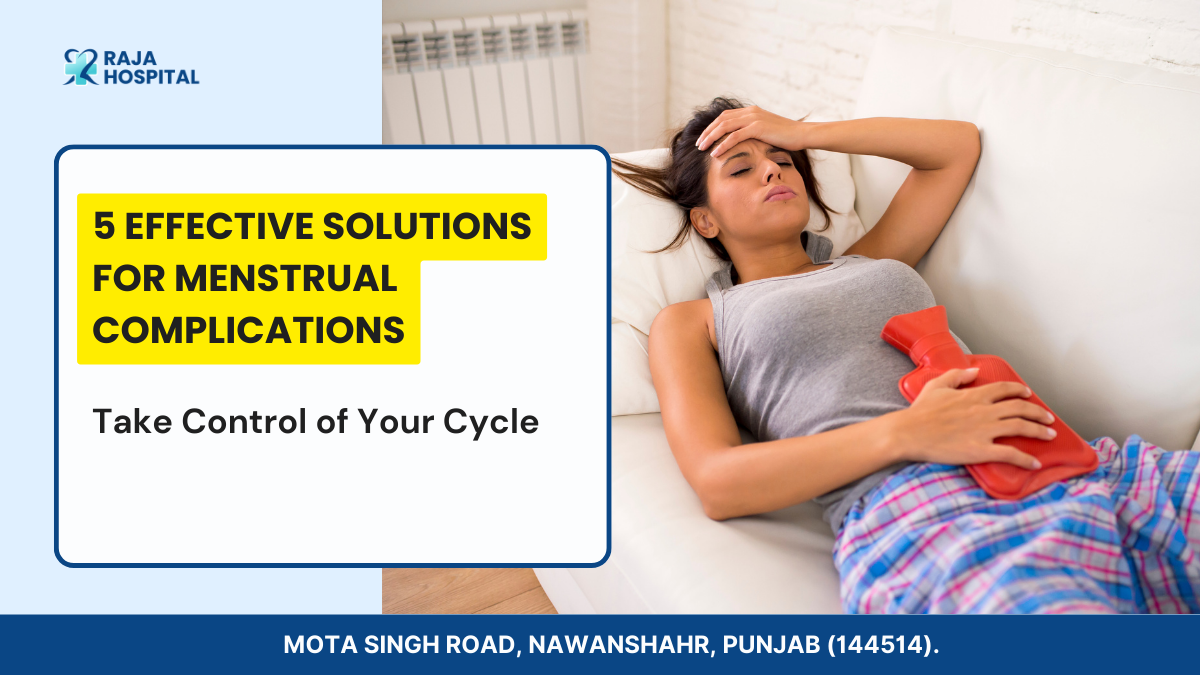5 Effective Solutions for Menstrual Complications: Take Control of Your Cycle

REVIEWED BY DR. LAKSHITA SAINI (MBBS, MS OBS & GYNAE) on 17th October 2024.
Hello, there! I’m Dr. Lakshita Saini and today, we’re diving deep into a topic that affects many individuals: menstrual complications.
Whether you’re grappling with irregular periods, heavy bleeding, painful cramps, or missed periods, understanding the root causes and discovering effective solutions can have a significant impact on your overall well-being. So, let’s delve into this important subject!
Irregular Periods
Irregular periods can be perplexing, but they typically have underlying reasons. Hormonal imbalances, stress, and medical conditions such as polycystic ovary syndrome (PCOS) can disrupt your menstrual cycle. It’s crucial to identify the cause for successful management.
Hormonal Imbalances
Your menstrual cycle is meticulously orchestrated by hormones. Any hormonal disruption can lead to irregular periods. Options for rebalancing hormones include hormonal therapy and birth control methods. Understanding your hormone levels through blood tests is an invaluable step in managing this.
Stress and Lifestyle Factors

Stress is a formidable disruptor of your body, and your menstrual cycle is no exception. Incorporating stress management techniques like yoga, meditation, or mindfulness can work wonders. Additionally, maintaining a well-rounded diet and a consistent exercise routine can help stabilize your cycle by reducing stress levels.
Heavy Bleeding (Menorrhagia)
Menorrhagia, characterized by excessive menstrual bleeding, can be a real nuisance. Common culprits include uterine fibroids, blood clotting disorders, and hormonal imbalances.
Uterine Fibroids
These noncancerous growths in the uterus can wreak havoc on your periods. Treatment options range from medications to surgical interventions. Consultation with a skilled gynecologist is essential for a comprehensive evaluation and discussion of the best treatment plan.
Blood Clotting Disorders
Some individuals are genetically predisposed to bleeding disorders. Medications and lifestyle changes can help manage this condition. Regular check-ups with a hematologist may be necessary to monitor and adjust your treatment plan as needed.
Hormonal Imbalances
As mentioned earlier, hormonal imbalances can significantly impact the flow of your periods. Your healthcare provider can prescribe medications like hormonal birth control or non-steroidal anti-inflammatory drugs (NSAIDs) to regulate heavy bleeding.
Painful Periods (Dysmenorrhea)
Dealing with painful cramps every month? You’re not alone. While cramps are usually due to uterine contractions, conditions like endometriosis and adenomyosis can exacerbate the discomfort.
Uterine Contractions
Normal uterine contractions can cause discomfort. Over-the-counter pain relievers like ibuprofen can help alleviate the pain. However, if your pain is severe and persistent, consult with a gynecologist to rule out other potential conditions.
Endometriosis and Adenomyosis

These conditions involve tissue growing outside or inside the uterus, respectively. Hormonal therapy and lifestyle changes are often used to manage the pain. In severe cases, surgical options may be considered. Don’t hesitate to discuss these possibilities with your healthcare provider to determine the best course of action.
Missed Periods (Amenorrhea)
Missed periods can trigger concerns about pregnancy or other issues. Common causes include pregnancy, stress, and conditions like PCOS.
Pregnancy
The most obvious reason for a missed period! If pregnancy is suspected, take a pregnancy test, and consult a healthcare provider for guidance.
Stress and Weight Fluctuations

Stress and significant weight changes can disrupt your menstrual cycle. Stress management techniques and maintaining a healthy weight can help regulate your periods. If missed periods persist, consult with a healthcare provider to rule out underlying medical conditions.
Diagnosing and Seeking Professional Help
Remember, it’s crucial to consult a healthcare provider for a proper diagnosis if you’re experiencing menstrual complications. They can perform various tests and examinations to determine the underlying cause and recommend an appropriate treatment plan.
Diagnostic Procedures
Your healthcare provider may conduct various tests, including blood tests to assess hormone levels, ultrasounds to examine the uterus and ovaries, or even a pelvic exam to evaluate your overall gynecological health.
Consulting with Specialists
Depending on your specific condition, you may be referred to specialists like gynecologists, hematologists (for bleeding disorders), or endocrinologists (for hormonal imbalances). These specialists can provide expert guidance and create tailored treatment plans, ensuring you receive the best care possible.
Self-Care and Prevention
While medical intervention may be necessary, there are also things you can do at home to ease discomfort and reduce the risk of menstrual complications.
Self-Care Tips

Applying a heating pad, getting plenty of rest, and staying hydrated during your period can alleviate discomfort. Tracking your menstrual cycle using apps or calendars can help you anticipate and manage symptoms more effectively.
Prevention
Maintaining a healthy lifestyle, managing stress through mindfulness and relaxation techniques, and staying proactive about your overall health can go a long way in preventing menstrual complications. Regular check-ups with your healthcare provider can help identify issues early and ensure you receive appropriate guidance.
Conclusion
That wraps up our comprehensive exploration of understanding and managing menstrual complications! Remember, you’re not alone, and there are solutions for most issues. Don’t hesitate to reach out to a healthcare professional for guidance tailored to your unique situation. Your menstrual health is a vital component of your overall well-being, so prioritize it and take good care of yourself.
